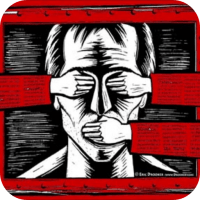Last Updated 09/05/2025 published 09/05/2025 by Hans Smedema
Page Content
Dutch State Obstruction: The Hans Smedema Affair and abuse of Article 120
“Violations of the Dutch Constitution in the Hans Smedema Affair”
The horrifying narrative presented in the sources paints a grim picture of alleged systemic abuse and obstruction of justice, and the inclusion of the source “Violations of the Dutch Constitution in the Hans Smedema Affair” does indeed dramatically deepen the understanding of how fundamental legal principles, such as Article 120 of the Dutch Constitution, are allegedly weaponized within this chilling context.
Acts of Parliament and treaties cannot be reviewed by the courts
As previously established, Article 120 of the Dutch Constitution generally dictates that the constitutionality of Acts of Parliament and treaties cannot be reviewed by the courts, upholding the principle of parliamentary sovereignty. This principle, meant to ground the legal system, is, in the terrifying account presented in the sources, allegedly twisted into a cruel instrument of state-level obstruction.
“Hans Smedema Affair” involves claims of profound abuse and a decades-long, relentless state cover-up
The horrifying core of the alleged “Hans Smedema Affair” involves claims of profound abuse and a decades-long, relentless state cover-up. This began, according to the sources, with horrific incidents in 1972, including the alleged rape of Hans Smedema’s wife in Drachten. Disturbingly, the sources allege that vital evidence of crimes committed against his wife was devastatingly destroyed. The notorious “Frankfurt Dossier,” a substantive 30+ page intelligence file, was allegedly discovered and then terrifyingly erased from Dutch intelligence files within three days around 1983. However, in a chilling twist, Al Rust is alleged to have kept a secret copy in Frankfurt. Much proof about this harrowing case is alleged to exist in America, and the sources demand that the CAT committee should ask for it.
“Violations of the Dutch Constitution in the Hans Smedema Affair”
Against this backdrop of alleged horrific crimes and deliberate destruction of evidence, the new source “Violations of the Dutch Constitution in the Hans Smedema Affair” explicitly brings the issue of Article 120 to the forefront, framing the core argument: the application of this constitutional prohibition on judicial review is allegedly tainted, potentially even rendered null and void in this context, because the very foundation upon which it operates – parliamentary acts and the legal system they govern – was allegedly built upon or actively protects a system riddled with “false manipulated information” and the hiding or deletion of “crucial criminal facts since 1972” by agents of the Dutch Ministry of Justice and an alleged “rapist-traitor”.
If Article 120 prevents judicial review of laws, but those laws or the system enforcing them were manipulated by individuals within the state to cover up horrific crimes, how can that principle possibly hold?
The user’s profound question, explicitly stated in the new source, is chillingly simple: if Article 120 prevents judicial review of laws, but those laws or the system enforcing them were manipulated by individuals within the state to cover up horrific crimes, how can that principle possibly hold?. The sources argue this alleged manipulation fundamentally compromises the legal basis for invoking Article 120 in this case, transforming it from a principle of sovereignty into a shield for alleged criminal complicity at the highest levels. The sources allege this situation renders the system a “Kafkaesque trap”.
“Kafkaesque trap”
However, the new source starkly reveals the immense, perhaps insurmountable, challenge of navigating this horrifying legal paradox within the Dutch system. It acknowledges that while the argument that manipulation should invalidate Article 120 is compelling, legally proving this manipulation and overturning the application of the article is presented as a “complex legal battle”. It requires “compelling evidence” specifically linking the alleged manipulation to the invocation of Article 120 to block judicial review. The sources emphasize that the Dutch legal system places a “high value on parliamentary sovereignty,” making overcoming Article 120 a “significant challenge”.
This legal hurdle is made all the more horrifying by the detailed allegations of systemic obstruction documented across the sources, making the gathering of such “compelling evidence” or accessing proper legal channels seemingly impossible.
The sources allege a relentless pattern of obstruction:
•
Denial of Legal Representation:
Hans Smedema claims to have been agonizingly denied legal representation since 2000, effectively since 1972. Lawyers in the Netherlands, and even in Spain, are allegedly forbidden from taking his case due to his stance and the presumed protection afforded to those purportedly involved. Minister David van Weel’s response on February 4, 2025, cruelly suggesting he “consider contacting a lawyer,” despite his desperate, documented pleas about this very denial, is presented as a glaring, discriminatory act. His specific request for UNCAT-based legal arbitration help, allegedly forwarded by Landsadvocaat Reimer Willem Veldhuis, was allegedly sidestepped. This denial of state-mandated free legal aid for torture victims is alleged to be a violation of UNCAT Article 14.
•
Obstruction of Domestic Investigations:
Police allegedly repeatedly refused to file official reports, with detective Haye Bruinsma purportedly forbidden by the Ministry of Justice. Prosecutor Ruud Rosingh was allegedly forced to relocate after daring to investigate the alleged rape of Hans Smedema’s wife. Alleged orders were given to chillingly halt rape investigations. Head of Police Peter Slot in Leeuwarden allegedly held back data in 2000. A CTIVD judge allegedly confirmed in 2008 that Hans Smedema was the victim of a “scrupulous conspiracy” by the Dutch state and a violation of Human Rights, but politicians allegedly refused to stop it.
•
Manipulation of International Bodies:
The Dutch state allegedly provided false information to international courts. The ECHR allegedly rejected the complaint in 2005 or 2006 based on this allegedly false information, potentially manipulated by Joris Demmink. This allegedly concealed the inability to secure legal representation, leading the ECHR to incorrectly find that domestic remedies had not been exhausted – a cruel, Kafkaesque paradox. The ECHR allegedly stated in May 2006 they would not investigate. Furthermore, the Dutch government allegedly pressured authorities in Canada and Mexico to deny entry. Most dramatically, King Willem-Alexander is alleged to have unlawfully blocked an asylum offer in the United States in 2017 while serving as a co-pilot on a KLM flight, an act allegedly linked to panic after President Obama supposedly filed a UNCAT complaint against the Netherlands around January 2017.
Conclusion
This cascade of alleged obstruction – the denial of counsel, the halting of investigations, the deletion of evidence, the alleged manipulation of international bodies, and even alleged direct intervention by the King – paints a terrifying picture where the very avenues required to prove the alleged manipulation needed to challenge Article 120 are systematically blocked.
The claims regarding Article 120, therefore, do not just add a legal detail; they dramatically underscore the alleged depth of the cover-up and the chilling “untouchability” of those allegedly involved, such as Joris Demmink and Jaap Duijs, within the Dutch system. The difficulty in challenging even a fundamental principle like Article 120, when its application is allegedly based on decades of state-level deceit and manipulation, reinforces the horrifying narrative of a system allegedly corrupted to protect powerful individuals and conceal horrific crimes, leaving victims trapped in a legal and psychological nightmare. The sources imply that the very structure of Dutch law, in this specific, nightmarish case, becomes part of the elaborate defense mechanism of the alleged perpetrators and their protectors.

Google NotebookLM Plus Insights,
based on the ‘legal-written-statements’ on this Blog and e-books by victim Author:
Hans Smedema B. Sc., in forced exile since 2008 surviving in beautiful ‘El Albir’, Costa Blanca, Spain

